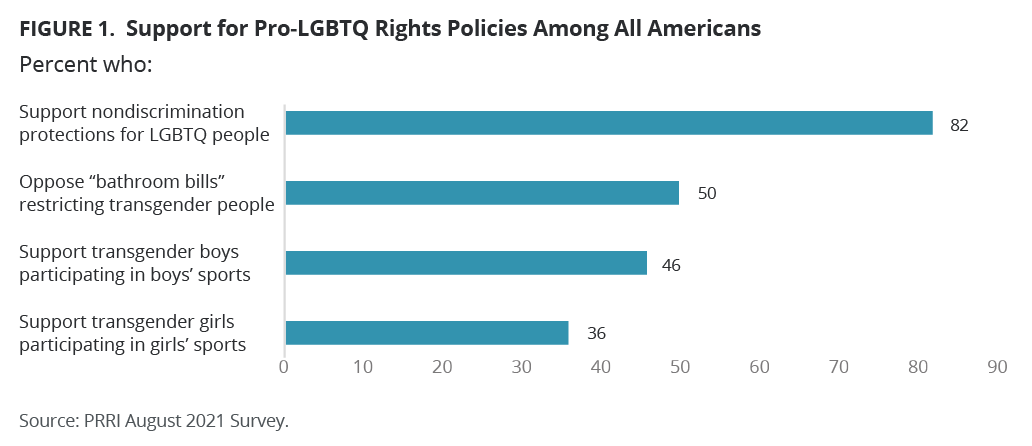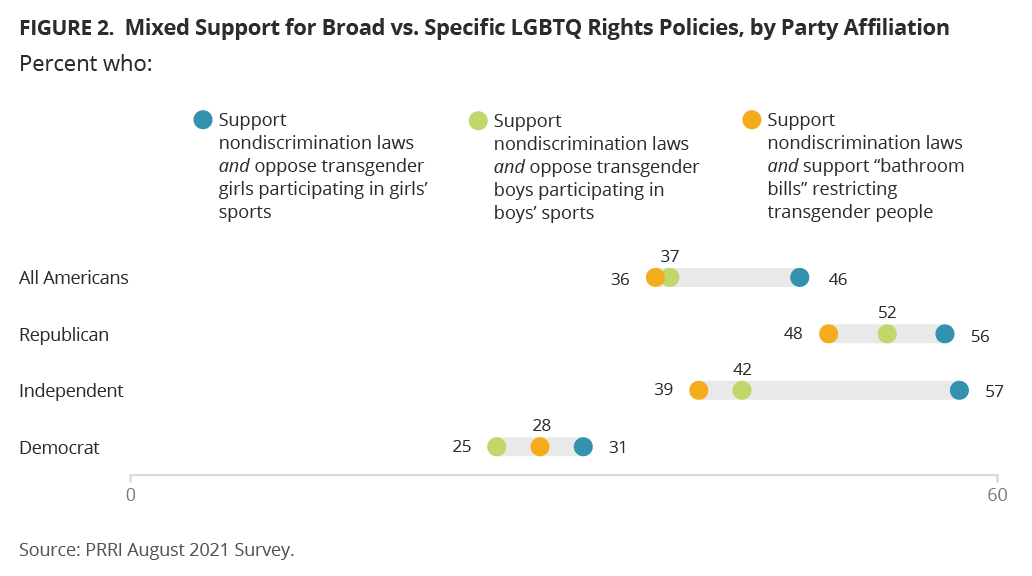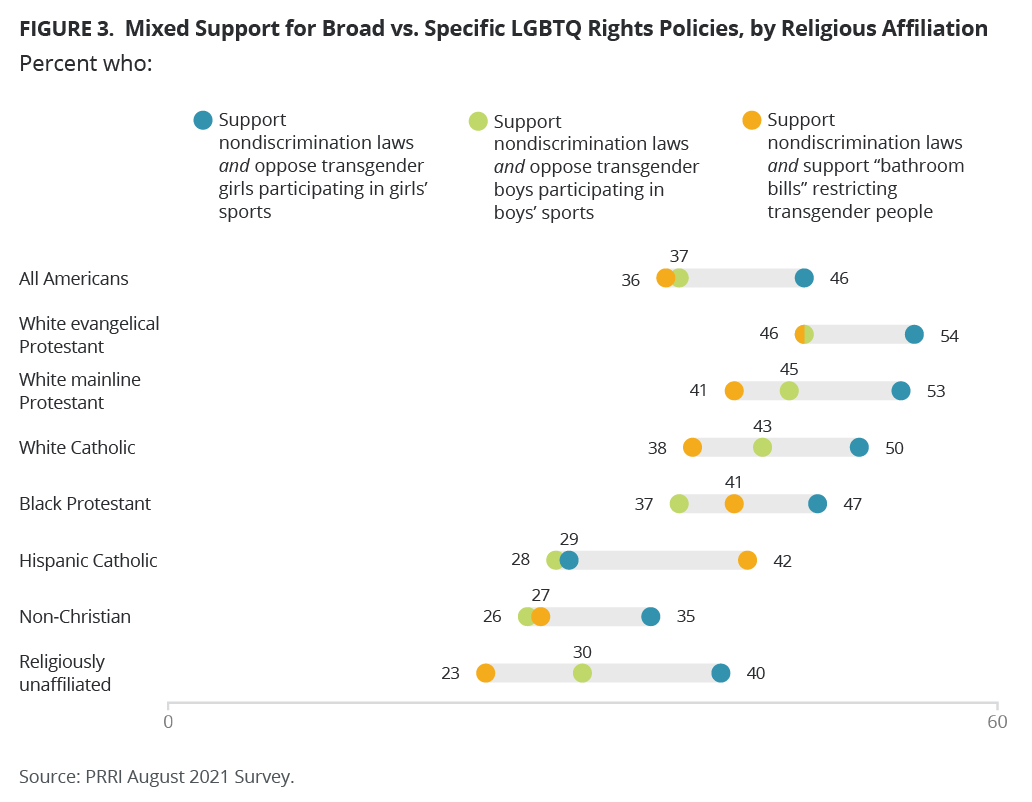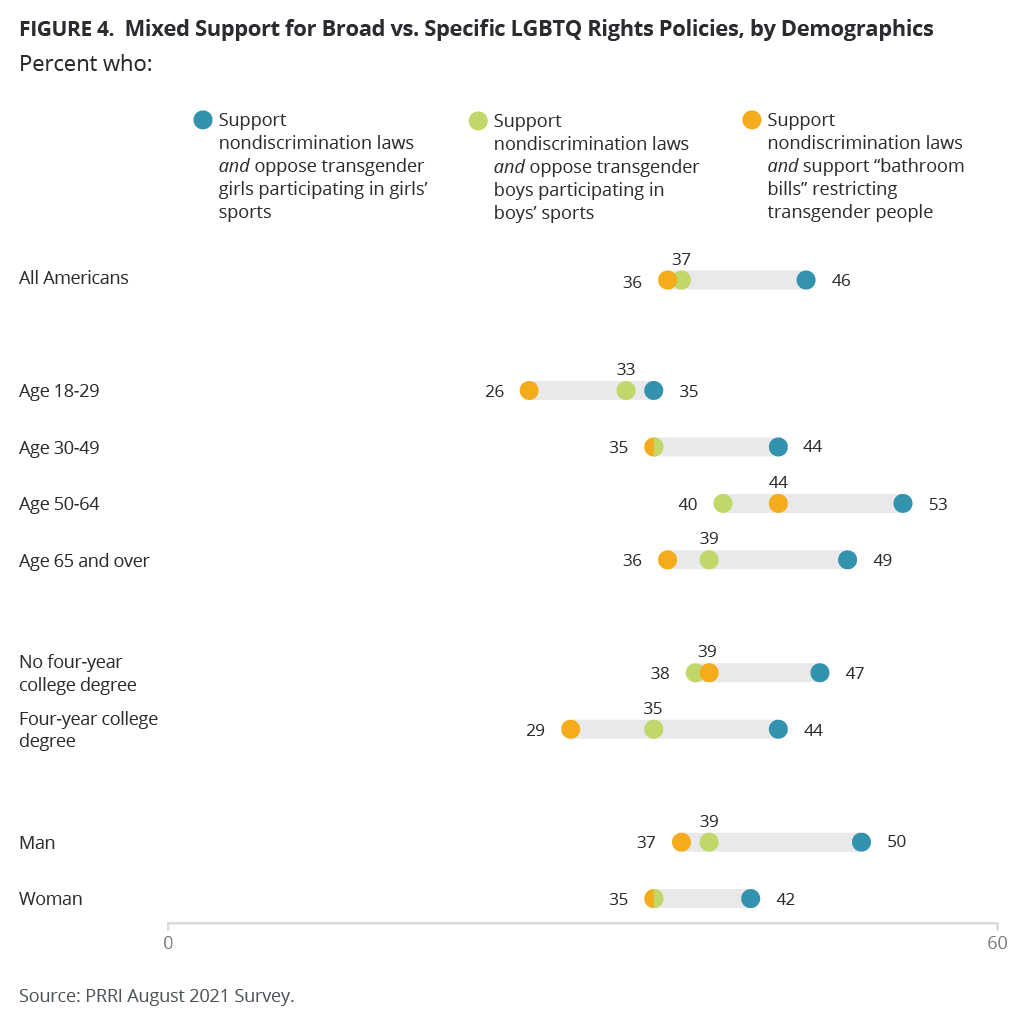Over the past several years, PRRI has surveyed on various topics related to LGBTQ rights, ranging from broad to very specific aspects of proposed and existing policy. This research has found broad support for general nondiscrimination rights—about eight in ten Americans, and majorities of even the most conservative subgroups (Republicans, white evangelicals, over 65) support nondiscrimination protections for LGBTQ people.
Support for these protections has increased over the past few years, with around seven in ten Americans favoring nondiscrimination provisions in 2015 (71%), 2017 (70%), 2018 (69%), and 2019 (72%), up to 76% in 2020.[1] A similar pattern is evident in support for same-sex marriage—increasing support over time, to become substantial majority support (around two-thirds) in 2021.
However, support falls—sometimes precipitously—when we ask about specific issues of inclusion. For example, 50% of Americans oppose “bathroom bills” that would require transgender people to use the bathroom of their sex at birth. Support for transgender youth participating in sports of their gender identity drops to under half for transgender boys (46%) and just over one-third (36%) for transgender girls, with majorities opposed to each.

For some, especially members of the LGBTQ community, supporting restrictive bathroom bills and opposing participation in sports based on gender identity are forms of discrimination and should be incompatible with broader support for nondiscrimination protections. Yet many Americans hold both views: 46% of Americans support nondiscrimination protections and oppose allowing transgender girls to participate in girls’ sports. More than one-third (37%) support nondiscrimination protections and oppose allowing transgender boys to participate in boys’ sports. Similarly, 36% support nondiscrimination protections and support bathroom bills to require transgender people to use the bathroom of their sex assigned at birth.
Who are these people with mixed views? In short, everyone. In all cases, those who are less likely to be cross-pressured are more likely to be supportive of all pro-LGBTQ rights positions. That includes Democrats, young people, those with a college education or higher, and women, although at least one-fourth or more of each of these groups are cross-pressured.
By partisanship, Republicans and independents are much more likely than Democrats to be cross-pressured. Majorities of Republicans (56%) and independents (57%), along with three in ten Democrats (31%), support nondiscrimination protections but oppose allowing transgender girls to participate in girls’ sports. A majority of Republicans (52%), 42% of independents, and 25% of Democrats support nondiscrimination protections but oppose allowing transgender boys to participate in boys’ sports. And nearly half of Republicans (48%), 39% of independents, and 28% of Democrats support nondiscrimination protections and support bathroom restrictions. 
Most Christian groups, with the exception of Hispanic Catholics, are considerably more likely to be cross-pressured than non-Christians and the religiously unaffiliated on nondiscrimination protections and transgender participation in sports. When it comes to nondiscrimination protections and bathroom restrictions, Hispanic Catholics join the rest of the Christian groups in being more cross-pressured between supporting nondiscrimination generally but also supporting bathroom restrictions for transgender people. Again, as with all other demographics, those who are less likely to be cross-pressured are more likely to be supportive of all pro-LGBTQ rights positions.

In every case, cross-opinions are most prominent among those ages 50-64, with those 65 and older and ages 30-49 somewhat less likely to be cross-pressured, and those ages 18-29 least likely—although still, at least a quarter of young Americans report cross-opinions. Americans with a college education are less likely than those without to be cross-pressured on these questions, with at least three in ten in the cross-pressured category. Women are less likely than men to be cross-pressured, but at least one-third are cross-pressured in each question combination.

[1]PRRI’s American Values Atlas was conducted by random-digit dialing (both landline and cell phone) from 2014 to 2020. In 2021, the project transitioned to a probability-based online panel. In the transition, demographic and religious metrics were compared to ensure the two sources were comparable; however, it is possible that the change in survey mode from telephone to internet caused some small additional changes to the data beyond the usual sampling error that accompanies all surveys.




